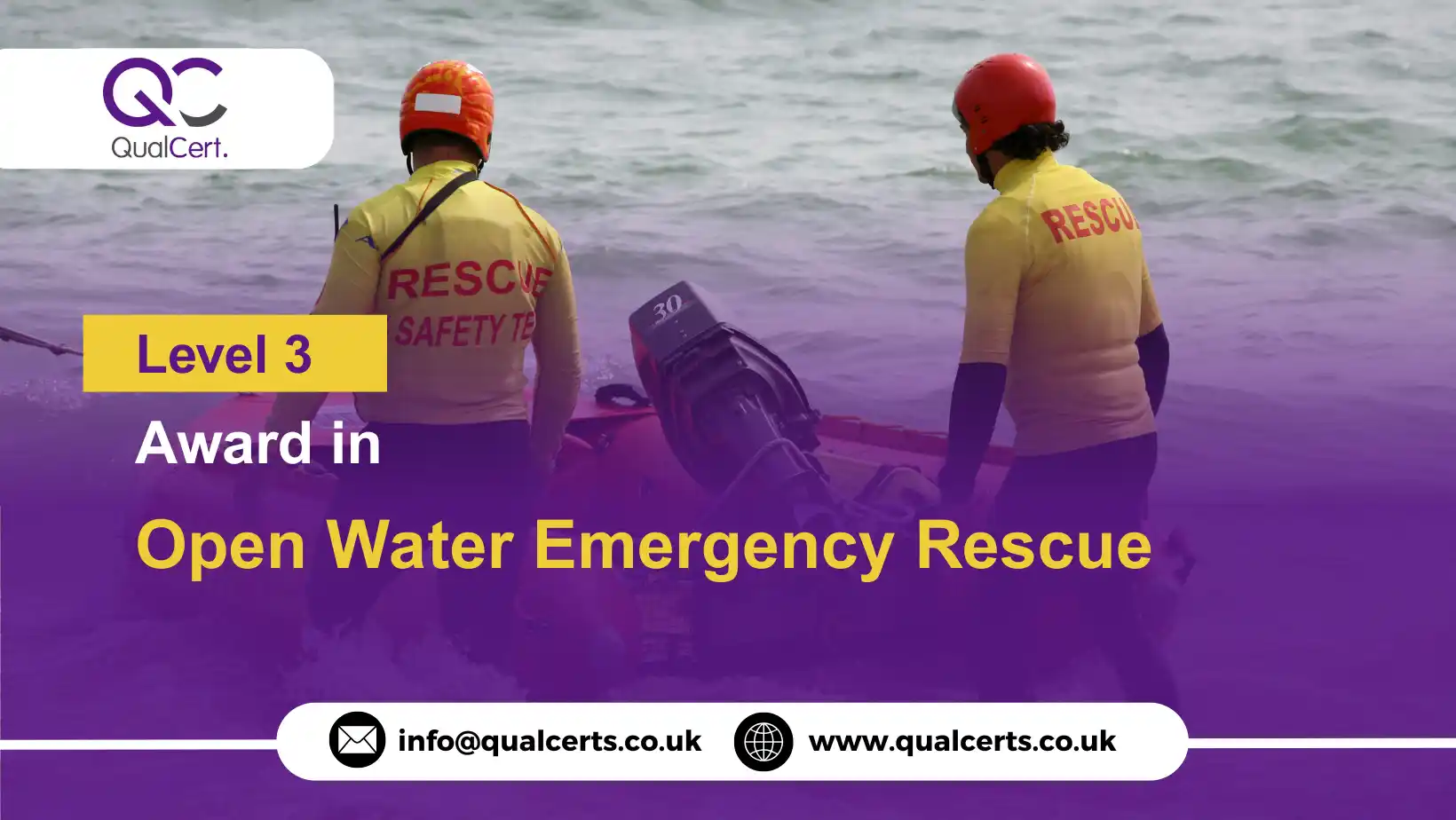The QualCert Level 3 Award in Open Water Emergency Rescue is a targeted qualification designed to equip individuals with the expertise needed to perform emergency rescues safely and efficiently in open water settings.
This award focuses on practical rescue techniques, risk assessment, and emergency response procedures tailored specifically for open water conditions. Participants develop vital skills to identify hazards, plan rescue operations, and use appropriate equipment, ensuring both rescuer and casualty safety.
Delivered over a compact timeframe, typically spanning two days, the course blends theoretical learning with intensive practical sessions. Topics include understanding open water dynamics, performing rescues in various conditions, and managing medical emergencies on site. The course also covers communication and teamwork, essential for coordinating effective rescue efforts.
Training is conducted by experienced instructors who bring real-world insights into the learning environment, helping participants build confidence and competence in dealing with open water emergencies.
Candidates are assessed through a combination of practical demonstrations and theoretical knowledge checks. Successful participants receive the QualCert Level 3 Award in Open Water Emergency Rescue, a nationally recognised qualification that meets professional standards.
The open water environment demands a specialised approach to emergency rescue. The QualCert Level 3 Award in Open Water Emergency Rescue prepares individuals to face these challenges with confidence and professionalism, helping to safeguard lives across the UK’s natural water venues.
Course Contents of QualCert Level 3 Award in Open Water Emergency Rescue:
The QualCert Level 3 Award in Open Water Emergency Rescue, offers 6 Credits, requiring a Total Qualification Time (TQT) of 30 hours, including 18 Guided Learning Hours (GLH).
| Unit Ref# | Unit Title | Credit | GLH | TQT |
| QC27004-1 | Introduction to Open Water Safety and Rescue Principles | 1 | 3 | 5 |
| QC27004-2 | Risk Assessment and Hazard Recognition in Open Water Environments | 1 | 3 | 5 |
| QC27004-3 | Rescue Techniques for Open Water Emergencies | 1 | 3 | 5 |
| QC27004-4 | Casualty Care and Incident Management in Remote Settings | 1 | 3 | 5 |
| QC27004-5 | Use of Rescue Equipment in Open Water Conditions | 1 | 3 | 5 |
| QC27004-6 | Legal, Ethical and Professional Responsibilities in Open Water Rescue | 1 | 3 | 5 |
Entry Requirements for the QualCert Level 3 Award in Open Water Emergency Rescue:
To enroll in the QualCert Level 3 Award in Open Water Emergency Rescue, following are requirement:
Minimum Age
- Learners must be 18 years of age or older at the time of registration.
- This ensures the maturity required for decision-making in high-risk environments.
Educational Background
- No formal academic qualifications are required.
- A general education level equivalent to Level 2 (GCSEs) is recommended to support understanding of course content.
Experience
- No prior professional rescue experience is required, although previous exposure to aquatic environments or basic water safety training is advantageous.
- Learners should be confident in open water and possess basic swimming ability, as practical assessments will take place in natural water environments.
Language Proficiency
- Participants must have proficient English language skills to engage with theoretical materials, participate in discussions, and follow safety instructions.
- A minimum of CEFR Level B1 (such as IELTS 5.0 or equivalent) is recommended.
- Training providers may assess language competency at the point of enrolment to ensure learner safety and comprehension.
Learning Outcomes of QualCert Level 3 Award in Open Water Emergency Rescue:
Introduction to Open Water Safety and Rescue Principles
- Understand the unique hazards of open water environments, such as currents and variable weather
- Recognise fundamental rescue principles and roles for responders in open water settings
- Appreciate differences between controlled pool rescues and open water operations
Risk Assessment and Hazard Recognition in Open Water Environments
- Identify common and hidden hazards specific to open water (e.g. submerged objects, tides, sudden depth changes)
- Conduct dynamic risk assessments that adapt to changing environmental conditions
- Use hazard awareness to inform safe rescue planning and decision‑making
Rescue Techniques for Open Water Emergencies
- Demonstrate safe and appropriate rescue entries and approaches based on environment and victim condition
- Apply both contact and non-contact rescue strategies effectively in open water
- Adapt rescue methods to account for environmental factors like waves, currents, and poor visibility
Casualty Care and Incident Management in Remote Settings
- Provide immediate and appropriate care to casualties in remote open water environments
- Use structured incident management plans to coordinate assistance and escalation
- Communicate effectively with additional support services while maintaining casualty safety
Use of Rescue Equipment in Open Water Conditions
- Select and deploy suitable rescue tools (e.g. throwlines, flotation devices, small craft) for open water conditions
- Use rescue equipment efficiently whilst ensuring personal and casualty safety
- Understand equipment limitations and hazards associated with its use in unpredictable water conditions
Legal, Ethical and Professional Responsibilities in Open Water Rescue
- Understand the duty of care and legal obligations governing open water rescue operations
- Uphold ethical standards when engaging with casualties and working under pressure
- Maintain professional conduct, ensuring compliance with organisational policies and best practices
The Level 3 Award in Open Water Emergency Rescue is crafted for individuals who support lifeguard teams or operate near open water settings but do not require full lifeguard certification. The course is ideal for:
- Support staff and assistants enhancing water safety at open water venues such as lakes, rivers, and coastal areas
- Outdoor professionals, including activity leaders and instructors, supervising group water activities
- Emergency volunteers and support personnel seeking confidence in basic open-water rescue techniques
- Individuals preparing for further progression to recognised open water lifeguard qualifications
This course equips participants with the essential skills and practical know-how to respond effectively and safely in open water emergencies.

